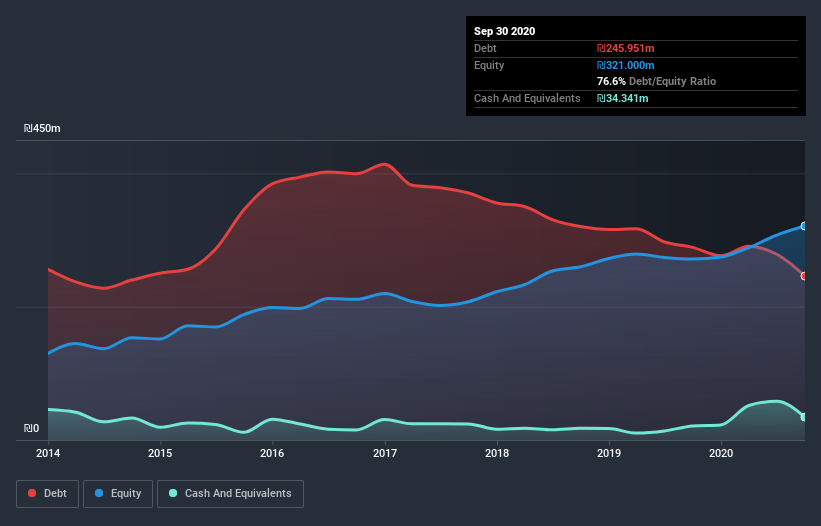
The external fund manager backed by Berkshire Hathaway's Charlie Munger, Li Lu, makes no bones about it when he says 'The biggest investment risk is not the volatility of prices, but whether you will suffer a permanent loss of capital.' When we think about how risky a company is, we always like to look at its use of debt, since debt overload can lead to ruin. As with many other companies Nissan Medical Industries Ltd. (TLV:NISA) makes use of debt. But the more important question is: how much risk is that debt creating?
What Risk Does Debt Bring?
Debt assists a business until the business has trouble paying it off, either with new capital or with free cash flow. Part and parcel of capitalism is the process of 'creative destruction' where failed businesses are mercilessly liquidated by their bankers. However, a more common (but still painful) scenario is that it has to raise new equity capital at a low price, thus permanently diluting shareholders. Of course, plenty of companies use debt to fund growth, without any negative consequences. When we examine debt levels, we first consider both cash and debt levels, together.
See our latest analysis for Nissan Medical Industries
How Much Debt Does Nissan Medical Industries Carry?
You can click the graphic below for the historical numbers, but it shows that Nissan Medical Industries had ₪246.0m of debt in September 2020, down from ₪289.0m, one year before. However, because it has a cash reserve of ₪34.3m, its net debt is less, at about ₪211.6m.

A Look At Nissan Medical Industries's Liabilities
We can see from the most recent balance sheet that Nissan Medical Industries had liabilities of ₪190.5m falling due within a year, and liabilities of ₪207.0m due beyond that. Offsetting this, it had ₪34.3m in cash and ₪91.0m in receivables that were due within 12 months. So it has liabilities totalling ₪272.2m more than its cash and near-term receivables, combined.
This is a mountain of leverage relative to its market capitalization of ₪272.5m. Should its lenders demand that it shore up the balance sheet, shareholders would likely face severe dilution.
We measure a company's debt load relative to its earnings power by looking at its net debt divided by its earnings before interest, tax, depreciation, and amortization (EBITDA) and by calculating how easily its earnings before interest and tax (EBIT) cover its interest expense (interest cover). The advantage of this approach is that we take into account both the absolute quantum of debt (with net debt to EBITDA) and the actual interest expenses associated with that debt (with its interest cover ratio).
Nissan Medical Industries's net debt is sitting at a very reasonable 1.8 times its EBITDA, while its EBIT covered its interest expense just 5.1 times last year. While these numbers do not alarm us, it's worth noting that the cost of the company's debt is having a real impact. Pleasingly, Nissan Medical Industries is growing its EBIT faster than former Australian PM Bob Hawke downs a yard glass, boasting a 106% gain in the last twelve months. There's no doubt that we learn most about debt from the balance sheet. But it is Nissan Medical Industries's earnings that will influence how the balance sheet holds up in the future. So if you're keen to discover more about its earnings, it might be worth checking out this graph of its long term earnings trend.
But our final consideration is also important, because a company cannot pay debt with paper profits; it needs cold hard cash. So the logical step is to look at the proportion of that EBIT that is matched by actual free cash flow. Happily for any shareholders, Nissan Medical Industries actually produced more free cash flow than EBIT over the last three years. That sort of strong cash generation warms our hearts like a puppy in a bumblebee suit.
Our View
Nissan Medical Industries's conversion of EBIT to free cash flow suggests it can handle its debt as easily as Cristiano Ronaldo could score a goal against an under 14's goalkeeper. But the stark truth is that we are concerned by its level of total liabilities. We would also note that Medical Equipment industry companies like Nissan Medical Industries commonly do use debt without problems. All these things considered, it appears that Nissan Medical Industries can comfortably handle its current debt levels. Of course, while this leverage can enhance returns on equity, it does bring more risk, so it's worth keeping an eye on this one. The balance sheet is clearly the area to focus on when you are analysing debt. But ultimately, every company can contain risks that exist outside of the balance sheet. For instance, we've identified 2 warning signs for Nissan Medical Industries that you should be aware of.
At the end of the day, it's often better to focus on companies that are free from net debt. You can access our special list of such companies (all with a track record of profit growth). It's free.
If you’re looking to trade Nissan Medical Industries, open an account with the lowest-cost* platform trusted by professionals, Interactive Brokers. Their clients from over 200 countries and territories trade stocks, options, futures, forex, bonds and funds worldwide from a single integrated account. Promoted
Valuation is complex, but we're here to simplify it.
Discover if Nissan Medical Industries might be undervalued or overvalued with our detailed analysis, featuring fair value estimates, potential risks, dividends, insider trades, and its financial condition.
Access Free AnalysisThis article by Simply Wall St is general in nature. It does not constitute a recommendation to buy or sell any stock, and does not take account of your objectives, or your financial situation. We aim to bring you long-term focused analysis driven by fundamental data. Note that our analysis may not factor in the latest price-sensitive company announcements or qualitative material. Simply Wall St has no position in any stocks mentioned.
*Interactive Brokers Rated Lowest Cost Broker by StockBrokers.com Annual Online Review 2020
Have feedback on this article? Concerned about the content? Get in touch with us directly. Alternatively, email editorial-team (at) simplywallst.com.
About TASE:NISA
Nissan Medical Industries
Through its subsidiary, engages in the manufacturing and marketing of spunlace non-woven fabrics in the United States, Canada, Europe, and Israel.
Excellent balance sheet established dividend payer.


